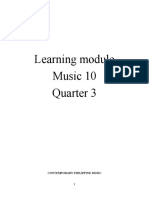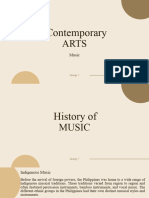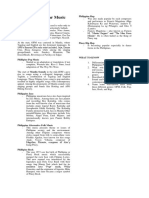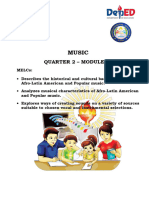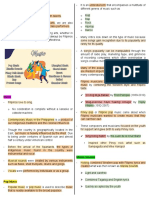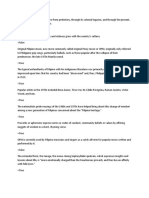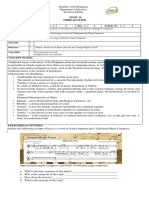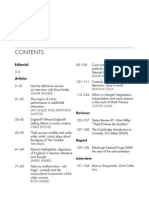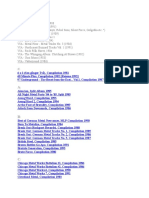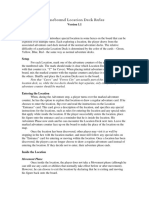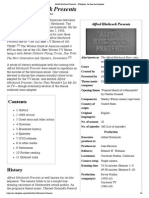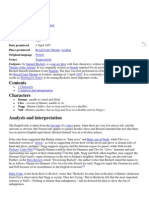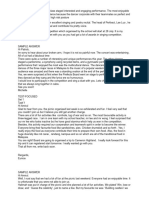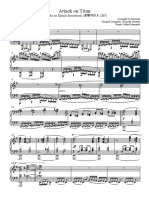MALUBAY, JOHN KENNETH S.
1-HM A
PPC ACTIVITY
B. WHAT IS PINOY POP?
Pinoy pop or P-pop (short for Pinoy popular music, Filipino pop, Philippine pop, Pilipino
pop) refers to a popular contemporary music in the Philippines originating from the OPM genre.
With its beginnings in the 1970s, Pinoy pop is a growing genre in year of 2020s. Through the
1990s to the 2000s, OPM pop was regularly showcased in the live band scene
C. What kinds of song were created?
Ang Huling El Bimbo
Rainbow
Tadhana
Kahit ayaw muna
Ligaya
Hanggang sa muli
Narda
Alab
D. How has western music influenced pinoy pop?
Music of the Philippines (Filipino: Musika ng Pilipinas; Spanish: Música de Filipinas) include
musical performance arts in the Philippines or by Filipinos composed in various genres and
styles. The compositions are often a mixture of different Asian, Spanish, Latin American,
American, and indigenous influences. Philippine music are performance arts composed in
various genre, and styles of popular music. These include Rock and Roll, Hip Hop, and Pop
music ranging from Western, and Eastern influence. The music of the Philippines is a mixture of
Primitive, European, and American.
E. What is OPM?
Original Pilipino Music, now more commonly termed Original Pinoy Music, (frequently abbreviated to
OPM) originally referred only to Filipino pop songs, especially those in the ballad form; such as songs
popularized in the 1970s through the mid-1990s by major commercial Filipino pop . 0OPM is the heart
of the Filipino people. It speaks the hearts and minds of the Filipinos, and it shows how truly talented
Filipinos are in the music industry. OPM is special because it was made by us and it represents us,
the Philippines.
�F. Search for Song ANAK by Freddie Aguilar?
No'ng isilang ka sa mundong ito
Laking tuwa ng magulang mo
At ang kamay nila ang 'yong ilaw
At ang nanay at tatay mo'y
'Di malaman ang gagawin
Minamasdan pati pagtulog mo
At sa gabi'y napupuyat ang iyong nanay
Sa pagtimpla ng gatas mo
At sa umaga nama'y kalong ka
Ng iyong amang tuwang-tuwa sa iyo
Ngayon nga ay malaki ka na
Ang nais mo'y maging malaya
'Di man sila payag
Walang magagawa
Ikaw nga ay biglang nagbago
Naging matigas ang iyong ulo
At ang payo nila'y sinuway mo
'Di mo man lang inisip na
Ang kanilang ginagawa'y para sa iyo
'Pagkat ang nais mo'y masunod ang layaw mo
'Di mo sila pinapansin
Nagdaan pa ang mga araw
At ang landas mo'y naligaw
Ikaw ay nalulong sa masamang bisyo
At ang una mong nilapitan
Ang iyong inang lumuluha
At ang tanong, "anak, ba't ka nagkaganyan?"
At ang iyong mga mata'y biglang lumuha
Nang 'di mo napapansin
Pagsisisi ang sa isip mo't
Nalaman mong ika'y nagkamali
Pagsisisi ang sa isip mo't
Nalaman mong ika'y nagkamali
Pagsisisi ang sa isip mo't
Nalaman mong ika'y nagkamali
His song, “Anak” became popular for its enlightening meaning that everyone could relate to. This song
won double platinum award weeks after it was released in the country. The song did not only become
�popular in the Philippines, but also in different parts of the world. It was translated in 26 languages and
was covered in 55 different countries. “Anak” was also included in many top-rated charts in other
countries such as Japan, Indonesia, The United States and countries from Western Europe. The song was
not a one-hit-wonder for it is not only popular wayback in 1978, but it’s still being used and it is still
known by the public. This song was also used by a Korean action movie entitled “Gangnam Blues” which
was released last March 2015. Now, that’s what I call a classic song!








